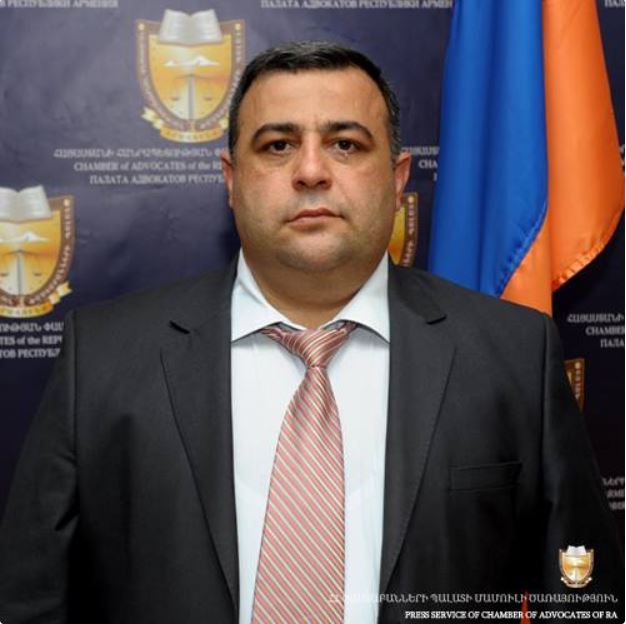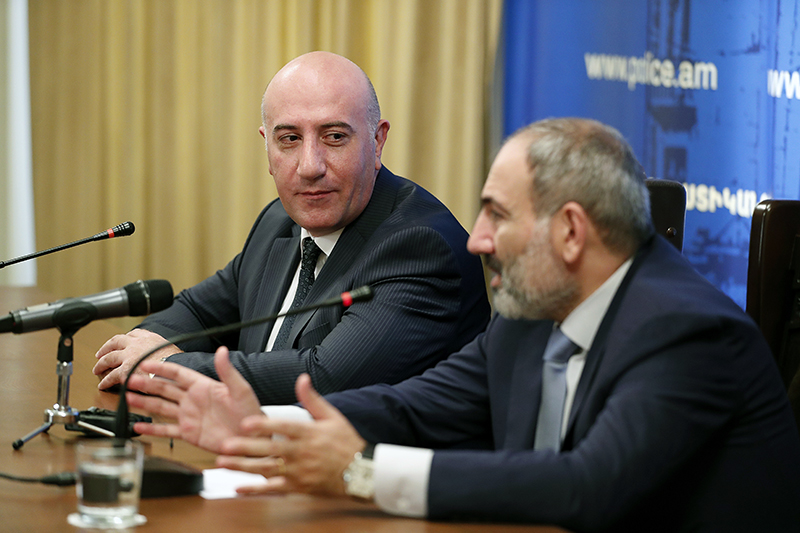
YEREVAN—Deputy Chief of the Armenian National Police Service Hovannes Kocharyan has been relieved of his responsibilities after publicly objecting to a bill currently being discussed in the National Assembly to change the way heads of the Armenian security community are appointed. President Armen Sarkisian signed a decree last week confirming this decision on the recommendation of Prime Minister Nikol Pashinyan. Vladimir Karapetian, the spokesman for the Prime Minister’s office, explained that the former Deputy Chief broke the law which requires police to remain neutral in politics.
Kocharyan’s dismissal comes a little over a month after the Prime Minister publicly sacked National Security Service (NSS) head Artur Vanetsyan and Police Chief Valeriy Osipyan. Both Osipyan and Vanetsyan had been career officers in their respective agencies, promoted in the wake of last year’s Velvet Revolution. While Osipyan had come under fire from watchdogs for the nature of his police reforms and the rise of petty crime under his watch, Vanetsyan had earned a reputation as a high-profile Pashinyan ally in the corruption investigations against notorious oligarchs.
According to the current law, the heads of the police and the NSS, the intelligence agency which replaced the Soviet-era KGB following independence, can only be promoted from within their ranks, thus limiting the Velvet government’s choices for these key roles. These two agencies, along with the State Revenue Committee, had previously been under the direct control of the president, but former President Serzh Sargsyan transferred them to the direct control of the prime minister in anticipation of an eventual switch to a parliamentary system following a controversial constitutional referendum in 2014. As a result, these agencies have developed reputations for opaque hierarchical structures sustained on personal relationships with the former president and a lack of any real accountability.
Pashinyan, who as leader of the opposition had been vocal in his condemnation of Sargsyan’s attempt to create a “super premiership,” has since been reluctant to relinquish these powers after taking office. However, his administration has worked with the opposition Bright Armenia Party to bring these agencies under parliamentary review. The latest bill proposed by Bright Armenia MPs would allow the prime minister to appoint any Armenian citizen over the age of 25, provided that they have resided in the country for a minimum of four years, to the NSS and police.
While the bill was widely expected to pass on its second hearing last week, it has been delayed at the request of Vladimir Vartanian, who chairs the legal affairs committee, for further review.
Some critics have defended Kocharyan’s criticism of the bill, arguing that subjecting the Police and NSS to outside political appointees will do little to promote accountability. Others still have accused the new government of trying to strengthen its hold on power by appointing loyalists to these critical segments of the Armenian security establishment.
Dr. Matthew Light, an associate professor of criminology at the University of Toronto who has extensively studied police reform in both Armenia and Georgia, characterized the bill as a positive step which establishes, both symbolically and practically, that the police, who have a constitutionally mandated monopoly on the use of force, are accountable to Armenia’s democratically elected political leaders. Pointing to the experience of other countries in the region, Dr. Light advises authorities to do more than simply place security forces under civilian institutional supervision. In-depth police reform “requires a long-term investment in reforming all aspects of police work, including training, personnel recruitment and management, and evaluation and incentive structures,” he told the Armenian Weekly.

While President Sarkisian has appointed Arman Sargsyan as acting police chief and Eduard Martirosian acting head of the NSS, Pashinyan has so far refrained from announcing his choices to head these key agencies. The date for the bill’s third reading has not yet been made public.


Considering that few weeks ago, My Step member governor of Ararat marz (Mr “crocodile man”) declared that police forces shall serve the government (!!), we can only worry about this project.
The views of Matthew Light are acceptable only in a case where democracy is well established, civil society is strong and every government is committed to genuine democracy which is not the case in Armenia. My Step often place its own political interest above the general interest, and is doing everything to place its pawns often at the expense of democracy.
They justify their actions by the strong mandate they received despite they got elected to bring transparency and improve the democratic level of Armenian institutions, instead they are just perpetuating old fashioned politics.
What else could we have expected from LTP cronies? The “revolution” is being hijacked. its essence is being thrown appart but its ok, the guy is good on selfies and looks sympathetic….